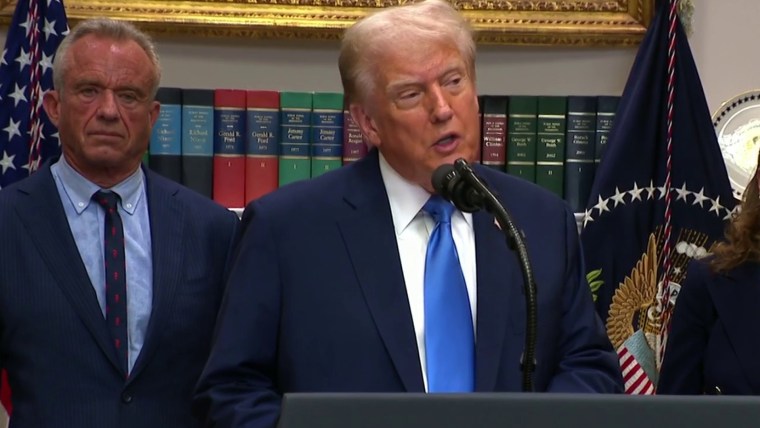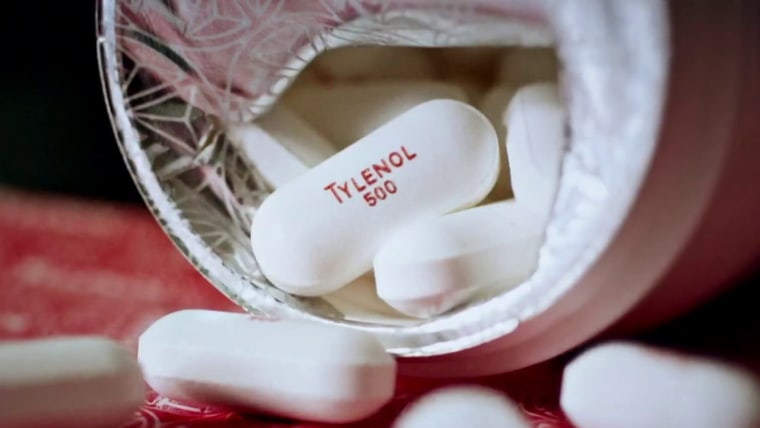President Donald Trump endorsed unsubstantiated claims about a link between Tylenol and autism Monday and made a variety of outlandish claims about childhood vaccinations, offering perhaps his most emphatic support to date of Health Secretary Robert F. Kennedy Jr.’s agenda.
At a White House briefing, Trump announced that his administration is issuing a warning to doctors not to recommend acetaminophen — the active ingredient in Tylenol and other widely used medications — for pregnant women, claiming it may be linked to autism in children.
“I want to say it like it is: Don’t take Tylenol. Don’t take it,” he said. “Fight like hell not to take it.”
Trump had been teasing the announcement for days, as Kennedy and other health officials have pledged to determine the cause of the developmental disorder by September. Researchers who’ve spent decades researching potential causes of autism say that the administration hasn’t uncovered new evidence — and that the existing data still doesn’t support its claims.
“This is not new,” Dr. Allison Bryant, a high-risk obstetrician at Massachusetts General Hospital in Boston, said in an earlier interview. “It has bubbled up every now and again with studies that show maybe some kind of association but not clearly showing any cause and effect.”
Trump also said the Food and Drug Administration moved to approve a chemotherapy drug called leucovorin as a treatment to alleviate symptoms of autism, based on limited evidence that it works in a small number of children.
He spoke alongside Kennedy, Food and Drug Administration Commissioner Marty Makary, National Institutes of Health Director Jay Bhattacharya and Mehmet Oz, administrator of the Centers for Medicare and Medicaid Services.
Kennedy has repeatedly suggested that rising rates of autism must be driven by “an environmental toxin” such as medicines or food additives, though scientists point to genetics and improvements in diagnoses as the likelier drivers. The bulk of scientific research hasn’t identified a link between acetaminophen and autism.
On Monday, Trump said multiple times that women and babies should “tough it out” without Tylenol because of the alleged autism risk, claiming there was “no downside” to doing so.
Acetaminophen is often recommended for pregnant women experiencing a high fever, since untreated fever itself can pose health risks to both the mother and the baby.
Kennedy said Monday that the FDA will issue a letter advising health care providers that acetaminophen should be used during pregnancy only in cases of high fever, when the fever itself may pose a health risk to the fetus.
Later Monday, Sen. Bill Cassidy, R-La., a gastroenterologist who has pushed Kennedy to follow the science on vaccines, called on HHS to release data that supports its claim about Tylenol and autism, adding that “the preponderance of evidence shows that this is not the case.”

The FDA’s notice, sometimes called a “Dear Doctor” letter, is meant to alert physicians and other prescribers about urgent or clinically significant safety issues it has identified with a drug. Kennedy also said the FDA will begin the process to initiate a safety label change for the drug.
White House press secretary Karoline Leavitt said in a statement that there is mounting evidence finding a connection between acetaminophen use during pregnancy and autism.
“The Trump Administration does not believe popping more pills is always the answer for better health,” she said.
She added: “President Trump pledged to address America’s skyrocketing rates of autism, and his team is deploying Gold Standard Science to deliver on this pledge. We will not be deterred in these efforts as we know millions across America are grateful.”
Bhattacharya said Monday that the NIH will dedicate $50 million to 13 research projects focused on identifying root causes and treatments for autism, an effort known as the “autism data science initiative.” The research will focus on environmental and medical factors, nutrition, events during pregnancy, biology and genetics, he said.
“Given this wide range of symptoms across the spectrum, it seems certain that there will be a wide range of biological contributors to explaining the cause,” he said.
Trump’s unusual claims about vaccines
Throughout the briefing, Trump floated a series of unverified — and at times unusual — claims about vaccines, suggesting that additives in shots may cause autism, that children receive too many vaccines before adulthood and that the Amish community doesn’t experience the disorder.
Trump in the past has been less vocally supportive of Kennedy’s anti-vaccine efforts, saying just last month that some vaccines are “amazing” and “we have to be very careful” about getting rid of vaccination mandates. But on Monday, he appeared more dubious of the childhood immunization schedule.
“They pump so much stuff into those beautiful little babies. It’s a disgrace,” he said. “It looks like they’re pumping into a horse. You have a little child, little fragile child, and you get a vat of 80 different vaccines, I guess, 80 different blends, and they pump it in.”
The childhood vaccine schedule includes around 15 different immunizations, according to the Cleveland Clinic, with some requiring more than one dose.
Trump also appeared to endorse certain recommendations made last week by the Centers for Disease Control and Prevention's vaccine advisory committee, which Kennedy recently staffed with vaccine skeptics. The group had weighed whether to delay the use of the hepatitis B vaccine at birth until infants were at least 1 month old but ultimately voted to table the decision.
Contrary to medical consensus, Trump said Monday that there was “no reason” to give the hepatitis B vaccine to newborns and suggested waiting until children are 12 years old, a position that doesn’t make scientific sense, considering the virus can be transmitted from mother to child during delivery.
Trump also suggested that young children should get separate chickenpox and measles, mumps and rubella shots, rather than a combination vaccine — in line with the advisory committee’s recommendation Thursday. Many public health experts have viewed the decision as taking choice away from parents.
Does leucovorin treat autism symptoms?
Leucovorin is approved by the FDA to counteract the side effects of certain chemotherapy drugs and is sometimes used off-label to treat vitamin B9 deficiency. It’s a form of folinic acid, a B vitamin, and has shown promise in clinical trials with helping some children with autism improve their speech.
Trump said the FDA updated the drug’s label Monday for the treatment of autism symptoms. And Oz said Medicaid — in partnership with states — will cover it with a prescription.
“We believe insurance companies will rapidly follow our lead,” he said.
But GSK, the maker of the brand name version of leucovorin, said in a statement that a drug application still needs to be submitted to update the label to include the new indication.
The Department of Health and Human Services also noted in a news release that leucovorin “is not a cure” for autism and “may only lead to improvements in speech-related deficits for a subset of children with ASD.”
The Autism Science Foundation, which funds evidence-based autism research, doesn’t recommend it as a treatment yet and says more studies are needed.
No new evidence linking Tylenol to autism
Experts say autism spectrum disorder, which is characterized by challenges in social and speech skills and repetitive behaviors, most likely stems from multiple factors rather than a single cause. It affects 1 in 31 children in the United States, according to the CDC.
Brian K. Lee, a professor of epidemiology at Drexel University in Philadelphia, said the science about root causes hasn’t changed recently.
“I’m not sure what the administration is doing, but it looks like they’re just going back and reviewing the evidence and they’re coming to a different conclusion than many scientists would,” he said, referring to the Trump administration’s finding Monday.
Acetaminophen was introduced in the United States in the 1950s as a prescription alternative to aspirin. By the 1970s, it had been made available over the counter, and it became one of the most commonly used pain and fever medications in the country. The American College of Obstetricians and Gynecologists and other major medical groups say acetaminophen is one of the only safe pain relievers for women during pregnancy, and studies have shown no clear evidence that use during pregnancy leads to developmental issues in kids. The drug is also found in name brands like Theraflu and Excedrin.
Forty percent to 65% of women use acetaminophen at some point during pregnancy, according to a 2014 study published in American Family Physician.
Trump administration officials are citing previous research, including a literature review that researchers from Harvard and the Icahn School of Medicine at Mount Sinai researchers published last month in the journal BMC Environmental Health. The review concluded there was most likely an association between autism and acetaminophen exposure during pregnancy.
Outside autism researchers, however, said that the review wasn’t rigorously conducted and that it cherry-picked studies that supported its conclusion.
The review’s senior author, Dr. Andrea Baccarelli, served in 2023 as a paid expert in a class action lawsuit against acetaminophen manufacturers, in which he testified that there was a link between the medication and autism. A judge ultimately excluded his testimony for being scientifically unsound and last year dismissed the case, which is being appealed.
Baccarelli said in a statement that he and his colleagues conducted a rigorous review and that the association with neurodevelopmental disorders was strongest when acetaminophen was taken for four weeks or longer. He said he discussed his findings with Kennedy and Bhattacharya in recent weeks.
“Further research is needed to confirm the association and determine causality, but based on existing evidence, I believe that caution about acetaminophen use during pregnancy — especially heavy or prolonged use — is warranted,” Baccarelli said.
However, other autism researchers have pointed to a large study last year published in the Journal of the American Medical Association that found no link between acetaminophen use in pregnancy and autism, ADHD or intellectual disability.
The study, from Lee and his colleagues in Sweden, analyzed data from more than 2.4 million children. When the researchers looked solely at children with autism, there was a small increased risk possibly associated with acetaminophen. But when the researchers compared siblings within the same families — one exposed during pregnancy, the other not — the link disappeared.
The comparison allowed them to control for variables that past studies couldn’t. Siblings share a large part of their genetic background and often have similar environmental exposures in utero and at home.
“The biggest elephant in the room here is genetics,” Lee said. “We know that autism, ADHD and other neurodevelopmental disorders are highly heritable.”
In an emailed statement, a spokesperson for Kenvue, the maker of Tylenol, said the drug is the safest pain reliever option for pregnant women.
“Without it, women face dangerous choices: suffer through conditions like fever that are potentially harmful to both mom and baby or use riskier alternatives,” the spokesperson said. “We believe independent, sound science clearly shows that taking acetaminophen does not cause autism.”
Bryant, of Massachusetts General Hospital, said, “The best science that we have available would still suggest that acetaminophen is a safe pain reliever and fever reducer in pregnancy.”



